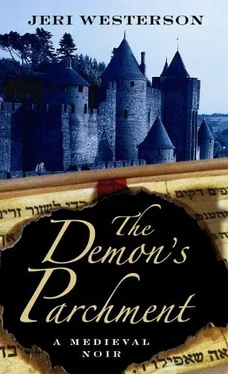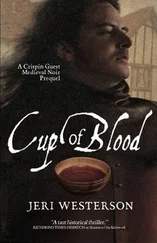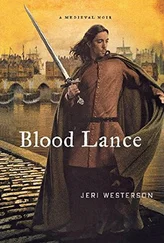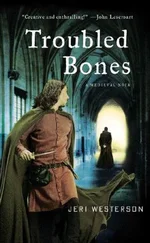Jeri Westerson - The Demon’s Parchment
Здесь есть возможность читать онлайн «Jeri Westerson - The Demon’s Parchment» весь текст электронной книги совершенно бесплатно (целиком полную версию без сокращений). В некоторых случаях можно слушать аудио, скачать через торрент в формате fb2 и присутствует краткое содержание. Год выпуска: 2010, Издательство: Macmillan, Жанр: Исторический детектив, на английском языке. Описание произведения, (предисловие) а так же отзывы посетителей доступны на портале библиотеки ЛибКат.
- Название:The Demon’s Parchment
- Автор:
- Издательство:Macmillan
- Жанр:
- Год:2010
- ISBN:нет данных
- Рейтинг книги:5 / 5. Голосов: 1
-
Избранное:Добавить в избранное
- Отзывы:
-
Ваша оценка:
- 100
- 1
- 2
- 3
- 4
- 5
The Demon’s Parchment: краткое содержание, описание и аннотация
Предлагаем к чтению аннотацию, описание, краткое содержание или предисловие (зависит от того, что написал сам автор книги «The Demon’s Parchment»). Если вы не нашли необходимую информацию о книге — напишите в комментариях, мы постараемся отыскать её.
The Demon’s Parchment — читать онлайн бесплатно полную книгу (весь текст) целиком
Ниже представлен текст книги, разбитый по страницам. Система сохранения места последней прочитанной страницы, позволяет с удобством читать онлайн бесплатно книгу «The Demon’s Parchment», без необходимости каждый раз заново искать на чём Вы остановились. Поставьте закладку, и сможете в любой момент перейти на страницу, на которой закончили чтение.
Интервал:
Закладка:
As they made their way down the icy steps, Crispin began his tale, and Jack listened wide-eyed to all its ups and downs, particularly when he came to the part about the dead servant. Several “God blind me” exclamations later, Jack drew silent.
There was slush upon the ground but the sky held no snow. It was washed in a mottled gray like the ocean after a storm. They moved south toward the Thames, making their way to Salt Wharf in Queenhithe. When they arrived, they hired a ferryman to take them across, and Jack stood at the bow like any other child excited to be making the trip. Crispin leaned on the side, looking out across the choppy, gray water. Skiffs speared the water beside them, their pilots glaring as if Crispin were invading their territory. Possibly, he was. He paid them no heed and pulled his hood down as far over his head as he could, trying to shield his face from the icy wind and spray. His mind was on death and blood and the treachery of Jews.
The Bankside suddenly loomed out of the mist. As they drew closer to the dock, fishermen mending their nets took shape out of the gloom.
He thought he could make out the smoke from the kilns though it might just be suspended fog. But perhaps it was only cooking fires from the row on row of houses and shops lining the riverfront. Crispin seldom traveled to Southwark. Not if he could help it. The stews did not interest him. At least that’s what he told himself. The truth lay more in practicalities. A tumble with a Bankside whore seemed less critical when one’s purse was empty.
As he stepped out onto the wharf and handed the ferryman a halpen, he could not help but feel surrounded by the low speech of Southwark such as came from Jack’s mouth. In his exile, Crispin had decided early on that he would not live in Southwark, no matter what it took. It was bad enough living on the Shambles, but to live on the Bankside with whores and thieves. .
His eye fell upon Jack springing forth from the ferry’s unsteady rolling bow and landing squarely on the wharf. The boy smiled up at him; a grin that was as wide as the Thames. So much for not living with thieves.
He raised his chin and took in the busy wharves and street above. The potters were not far, for indeed that had been smoke coming from the hardworking kilns of London. He could smell it now.
He followed his nose while Jack ran back and forth at his heels like a pup. He was quite proud of Jack for coming up with the notion. The boy was sharp, no question about it. It surprised him that a creature of such low beginnings could be so clever, but with a bit of gloating, he owed much of Jack’s shrewdness to himself and his careful tutoring.
Jack raised his arm and pointed. “That’s the potters,” he said. “They’re the ones I seen yesterday. I watched them for a good long time, Master. I talked a fair bit to one of them apprentices, a boy named Wat. He told me about their trade. They make jugs and cooking pots and such. But business is getting poorly, so he says. His master is worried that they might have to find another vocation.”
“Business is that bad?”
“Oh aye. So he said. But he is just an apprentice.”
“I find the word of apprentices more and more valuable these days.”
Jack missed the compliment. His attention was taken by the many ovens as they cleared the corner, of the young men carrying buckets of clay hanging from yokes over their bent shoulders, of young boys balancing vast bundles of sticks on their heads.
It was hard to believe that this industriousness might all be for nought. Crispin watched silently from across the lane, staying in the shadows. Jack fairly vibrated beside him, no doubt impatient for Crispin to do something. But Crispin had no need to do anything as of yet. He, too, wanted to watch the work, especially the men and even women he could see through doorways, their feet pushing at a wheel while they worked their alchemy on a shapeless slab of clay. With hands drenched in murky water, they brought forth tall hourglass-shaped jugs and squat, round-bellied pots. Decorations were daubed onto the sides in diamond patterns and basket weaves, or merely rolled on with small wheeled instruments.
Quick as a wink, a pot was done, pulled from the wheel, and placed on a shelf. Another blob of clay was thrown to the wheel, and the potter began again, something new emerging from his clever hands.
“Aye, Master,” said Jack. “I could watch them all day. I nearly did. It’s a right fine skill, that is. But I ain’t clever with me hands. I’d best settle on using me mind and becoming a Tracker, like you.”
He snapped a sidelong glance at his young charge. “I know it is a step down from a potter, Jack.”
But Jack suddenly straightened and speared his arm outward. “There’s Wat now!”
A stick-thin boy with gaunt features and straw-colored hair staggered under the burden of a bundle of fuel a donkey might have balked at carrying. It was not an unusual sight to see such young boys working harder than beasts, but Crispin felt a strange sensation in his belly watching this lad. It seemed he noticed all the young boys in London now, seeing them as potential victims and wondering how on earth he was to protect any of them.
“Wat!” Jack sprinted toward him and immediately took the sticks from his shoulders, carrying them himself. Wat’s look of relief was heartbreaking.
“Jack,” said the boy. A smile spread on his face, stretching the chapped skin to a shiny sallow color. But when his eyes lifted to Crispin, the smile vanished.
“Wat,” said Crispin mildly. “I am pleased to make your acquaintance.”
Wat looked uncertainly at Jack. “This is me master, Crispin Guest. Worry not. He’s a good soul.”
The boy seemed disinclined to believe this and remained standing beside his stick bundle.
“This business of pot-making,” said Crispin, sweeping the row of ovens casually with his arm. “It is fascinating work. Your master must be very skilled.”
The boy said nothing. His hollow-eyed stare was becoming unnerving.
“And so,” said Crispin, trying like the devil to think of something to say to draw the boy out, “I am most interested in how it is done. Perhaps you can enlighten me.”
Wat’s glassy stare rested on Crispin for a long while before he turned it back toward the workers. “There ain’t much to tell,” he said in a slow, careful voice. “You get the clay and you keep it in the slip, and put it on the wheel and then. . you work it.”
“So I see.” Crispin nodded importantly, not truly understanding. He rocked on his heels. “And the clay. Where does it come from?”
The boy squinted. It ruined his already long face by twisting it strangely, and gave an expression that rather assumed Crispin was a simpleton. He thumbed behind him. “It comes from the Thames, don’t it?”
“That it does,” he said, feeling a bit foolish. “Perhaps I can talk to your master.” Crispin dropped his friendly tone and used one reserved for menials. The boy certainly recognized it. He snatched the stick bundle from Jack and hefted it up to his shoulders.
“I’ll take you to him.”
Jack scrambled happily beside his new friend while Crispin took up the rearguard. They threaded through the busy path of muddy snow and clay. Freshly fired pots stood in a row in the mud outside a few shops and huts. Women wove through the streets, bringing bread and salted fish to some of the men.
Wat lumbered on, finally dropping his bundle with a great sigh when they came to a hovel at the end of the row. He didn’t look back as he entered and Jack followed him right behind. Crispin was a bit more cautious as he ducked his head to enter the low doorway. He looked around, his eyes adjusting to the dark space. The floor was made of rotting planks covered in a layer of dust, except for the places where water had been sloshed or muddy footprints had tramped.
Читать дальшеИнтервал:
Закладка:
Похожие книги на «The Demon’s Parchment»
Представляем Вашему вниманию похожие книги на «The Demon’s Parchment» списком для выбора. Мы отобрали схожую по названию и смыслу литературу в надежде предоставить читателям больше вариантов отыскать новые, интересные, ещё непрочитанные произведения.
Обсуждение, отзывы о книге «The Demon’s Parchment» и просто собственные мнения читателей. Оставьте ваши комментарии, напишите, что Вы думаете о произведении, его смысле или главных героях. Укажите что конкретно понравилось, а что нет, и почему Вы так считаете.












